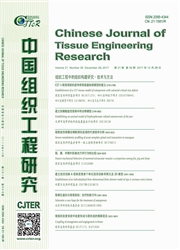

 中文摘要:
中文摘要:
背景:微卫星不稳是一种重要的基因改变方式,在肿瘤的发生中起重要作用,其发生是由于错配修复基因发生缺陷所致.错配修复基因hMLH1突变在遗传性非息肉性大肠癌中的作用已有报道,但在散发性大肠癌的作用尚缺乏深入的研究.目的:探讨错配修复基因hMLH1突变在大肠癌发生中的作用及与微卫星不稳的关系.设计:单一样本实验.单位:解放军第三军医大学西南医院消化科.材料:76例大肠癌及相应正常组织均为2001-01/2003-12西南医院外科手术切除标本,所有患者均无肿瘤家族史,并未接受过放疗和化疗,对实验知情同意.方法:采用二维DNA电泳和DNA测序技术检测hMLH1突变;采用聚合酶链反应为基础的方法检测微卫星不稳.主要观察指标:①大肠癌hMLH1突变及微卫星不稳检出率.②微卫星不稳与hMLH1突变的关系.结果:①76例大肠癌中检出hMLH1基因突变8例,突变率为10.5%,检出微卫星不稳20例,检出率为26.3%.右侧大肠癌hMLH1突变和微卫星不稳的检出率显著高于左侧大肠癌(6/26比2/50,x2=4.739,P=0.029;11/26比9/50,x2=5.212,P=0.022),hMLH1突变和微卫星不稳与肿瘤大小、分化程度、组织学类型、浸润深度、淋巴结转移和临床病理分期无显著相关.②将微卫星不稳分为高频率微卫星不稳(≥2个位点)10例、低频率微卫星不稳(仅为1个位点)10例和微卫星不稳阴性56例3组,8例hMLH1基因突变均发生于高频率微卫星不稳组,而低频率微卫星不稳和微卫星不稳阴性组未见有突变者.结论:hMLH1基因突变与微卫星不稳多发生于右侧大肠癌,hMLH1突变与高频率微卫星不稳大肠癌的发生有关.
 英文摘要:
英文摘要:
BACKGROUND: Microsatellite instability (MSI), an important gene change type, plays an important role in the occurrence of tumor. Mismatch repair gene induces its occurrence. Although the effect of mismatch repair gene hMLH1 mutation in the hereditary nonpolyposis eoloreetal cancers (HNPCC) has been reported, its effect on the sporadic eoloreetal carcinoma lacks in-depth study. OBJECTIVE: To investigate the effect of mismatch repair gene hMLH1 mutation on eoloreetal carcinogenesis, and its correlation with MSI. DESIGN: Single-sample experiment. SETTING: Department of Gastroenterology, Southwest Hospital of Third Military Medical University of Chinese PLA. PARTICIPANTS: Seventy-six cases of sporadic eoloreetal carcinoma and corresponding normal tissues were obtained from surgically resected specimens of eolorectai carcinoma in Southwest Hospital between January 2001 and December 2003. No patients had family history of tumor, or had received radiotherapy and chemotherapy. Patients were informed of the experiment. METHODS: Mutation of hMLH1 was detected by two-dimensional electrophoresis and DNA sequencing; MSI was analyzed by PCR-based methods. MAIN OUTCOME MEASURES: (1) Detection rate of hMLH1 mutation of eoloreetai carcinoma and MSI. (2) The relationship of MSI and hMLH1 mutation. RESULTS: Seventy-six cases of sporadic eoloreetal carcinoma were studied for hMLH1 mutation and MSI. hMLH1 mutation was detected in 8 (10.5%) cases of colorectal carcinomas while MSI was detected in 20 (26.3%) cases of eoloreetai carcinomas. Frequency of hMLH1 mutation and MSI was significantly higher in right colorectai cancer than in left colorec tal cancer (6/26 vs 2/50, X^2=4.739, P=0.029; 11/26 vs 9/50,x^2=5.212, P=0.022). No association was observed between hMLH1 mutation or MSI and tumor size, differentiation, histological type, depth of invasion, metastasis or clinical pathological stages.(2) MSI was divided into high-frequency group (≥ 2 loci, n=10) and low-frequency group ?
 同期刊论文项目
同期刊论文项目
 同项目期刊论文
同项目期刊论文
 期刊信息
期刊信息
